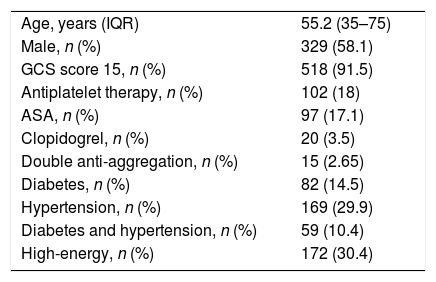The use of antiplatelet agents is increasing, mainly in elderly patients in whom cranial trauma is a frequent reason for consultation to the emergency department. In this context, discordances have been described regarding the increased risk of post-traumatic injury that involves taking antiplatelet drugs. Therefore, the objective of this present study was to analyse factors associated with intracranial bleeding after mild brain trauma.
Patients and methodsA retrospective study was designed that included all patients who had consulted the emergency department during 2016 because of mild brain trauma (Glasgow coma scale 14–15) and excluded patients under anticoagulant therapy. A logistic regression analysis was performed to analyse the variables associated with intracranial bleeding.
Results566 patients were included in the study. 18% of them were taking antiplatelet drugs. Tomography showed haemorrhagic intracranial damage in 16.1%. Factors associated with intracranial bleeding were: advanced age, Glasgow coma scale <15, high-energy trauma and antiplatelet therapy.
DiscussionAntiplatelet therapy emerges as a risk factor for intracranial bleeding after mild head trauma, in addition to other known factors.
El uso de antiagregantes plaquetarios está aumentando, fundamentalmente en pacientes de edad avanzada en los que el traumatismo craneal es un motivo habitual de consulta en urgencias. En este contexto existe discordancia sobre el riesgo aumentado de lesión postraumática que supone la toma de antiagregantes. Por tanto, el objetivo de este estudio fue analizar los factores asociados con la presencia de sangrado intracraneal tras traumatismo craneoencefálico leve.
Pacientes y métodosSe diseñó un estudio retrospectivo, incluyendo todos aquellos pacientes atendidos en 2016 por traumatismo craneoencefálico leve (escala de coma de Glasgow 14-15), excluyendo los pacientes en tratamiento anticoagulante. Se realizó un análisis de regresión logística para analizar las variables asociadas con sangrado intracraneal.
ResultadosQuinientos sesenta y seis pacientes fueron incluidos. El 18% de los pacientes tomaba antiagregantes. La tomografía mostró lesión intracraneal hemorrágica en el 16,1%. Los factores asociados con sangrado intracraneal fueron: edad avanzada, escala de coma Glasgow<15, traumatismo de alta energía y toma de antiagregantes.
DiscusiónLa terapia antiagregante emerge como factor de riesgo de sangrado intracraneal tras traumatismo craneoencefálico leve, además de otros factores ya conocidos.









